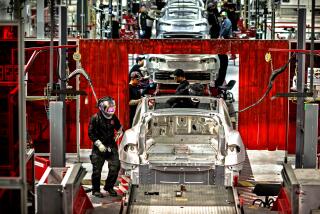General Motors Reopens Truck Facility
DETROIT — In the face of continuing strikes that are crippling production, General Motors Corp. on Monday recalled about 2,900 workers at an assembly plant where its important new full-size pickup truck will be built.
GM called back the workers to the plant in Pontiac, Mich., just a day after high-level talks failed to end a six-week labor dispute with the United Auto Workers.
The auto maker also reopened three other assembly plants that had been closed for summer vacation break. The plants--the Saturn complex in Tennessee, a truck factory in Canada and a low-volume car facility in Mexico--have continued operating despite the strikes, which began June 5 and June 11.
The strikes by 9,200 union workers at two parts facilities in Flint, Mich., have forced GM to close all but a few of its 29 North American assembly plants and furlough about 165,000 workers. The walkouts have caused GM to lose production of 227,000 vehicles.
GM, which will report earnings today, has previously said that second-quarter profit will be reduced $1.2 billion because of the strikes. Analysts say losses could exceed $2 billion by the end of the month.
The auto maker is concerned that the strikes over job security and plant efficiency will complicate the launch of the redesigned Chevrolet Silverado full-size pickup and its sister, the GMC Sierra.
“It’s GM’s most important product,” said Wes Brown, analyst for Nextrend, a Thousand Oaks consulting firm.
The Silverado is GM’s highest-volume vehicle and one of its most profitable. The company hopes to sell as many as 900,000 full-size pickups a year, at a profit of more than $5,000 a vehicle.
The truck is currently in low-volume production at a plant in Oshawa, Canada, one of the facilities GM has managed to keep running. Plants in Pontiac and Fort Wayne, Ind., also are slated to begin production later of the Silverado.
GM said late Monday that it is recalling 2,880 workers for pre-production of the Silverado and Sierra. The move is as much symbolic as substantive as it shows GM’s determination to keep the launch moving forward.
Craig Cather, analyst for CSM Forecasting in Lansing, Mich., said GM wants to build enough Silverados so that it can ship at least one to each dealer. This would allow customers to see the new product and perhaps dissuade them from switching to Ford or Chrysler.
“They hope to cut off some of the competitive threat the new vehicle faces as a result of the strikes,” he said.
Meanwhile, contract talks continued on the local level at the two striking Flint plants, as well as at another factory in Flint and plants in Dayton, Ohio, and Indianapolis where strikes are threatened. The Flint talks showed some progress as bargainers met all day Monday.
Hope for a quick settlement was dashed during the weekend, however, when talks between Gerald Knechtel, GM’s labor vice president, and Richard Shoemaker, UAW vice president, failed to reach a broad agreement that could end all the disputes.
Analysts appear resigned to a long struggle, one that could cost GM as much as $80 million a day and present the prospect of discontinued product lines and permanent plant closings.
“I think it will get settled in weeks, not days,” said David Healy, analyst with Burnham Securities.
GM has hinted that it may try to reopen some plants using parts bought from outsiders, but analysts said it’s unlikely the company could find enough parts in the volume needed any time soon.
GM shares fell $2.31 to close at $69.88 on the New York Stock Exchange.






